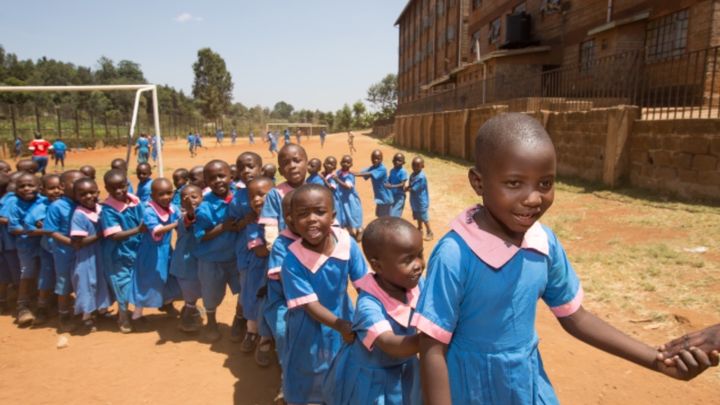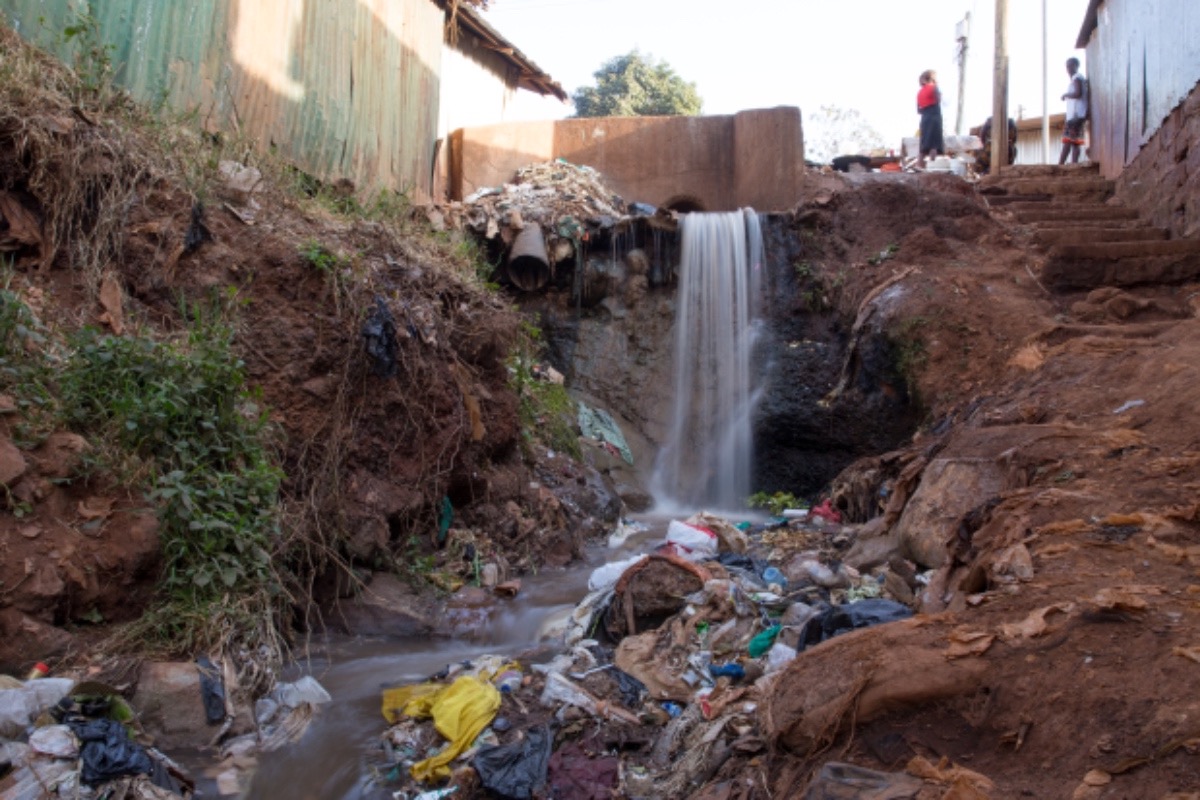
Solar Power St. Martins School in Nairobi Kenya
Donation protected
Millions of the planet's most vulnerable live in densely populated informal settlements called slums. Kibagare is one such settlement in the sprawling urban city of Nairobi, Kenya.
Informal settlements like Kibagare host dense populations with few public services. Here, waterborne disease, poverty and hunger prevail. River water, waste, sewage, and the playground are often one mix. There are only 16 latrines (bathrooms) and just 11 points of clean water available to the 50,000 plus population.
However, St Martins School in Kibagare is an oasis in the slum life. Here children enjoy early, primary and secondary childhood education, food, clothing and safety. St Martins is run by the Assumption Sisters of Nairobi and our Friends and Family sponsor 400+ of the 1000 students in school with annual scholarships.
The problem of energy in kibagare:
Kibagare relies on poor-quality, inconsistent, expensive and unsafe energy. People tend to buy illegal connections from local cartels or use unsafe gases in their shanty homes. St Martins ability to keep the kids nurished from the kitchen, educated from the computer labs and classrooms requires consistent access to power. The clean water supply also requires power to pump the water from the borehole we installed in 2018. St. Martin's sponsorship program manager , Alfred Aswan states that even now, there is an average of 1.5 days a week of power outages. During these outages the school does not have access to warm nor clean water, kitchen services, light, and electricity to power their computers. Evidently, this harms the children’s education as the teachers rely heavily on the internet. Therefore, providing the school with a more reliable power source is crucial.
Solution and Benefits:
We have proposed a sustainable solution to this drastic problem. Essentially, we are trying to use solar energy (solar panels) to power the school. Solar energy offers the best benefits as it is a renewable energy source emitting far less toxic emissions from fossil fuels into the air. In the long term this will hugely benefit the school as they will rely on the sun for power and luckily Kenya is known for its bright sun! Another advantage of using solar energy is that it does not have operation cost so once the project payback period is over, the school virtually utilises free energy. Considering the panels expected lifespan is over 20 years, we have estimated that the solar project has a payback period of less than three years (33 months)
In previous years we have successfully implemented two solar projects in some areas of the school thanks to donors like you! We have solar powered with great success the primary school computer lab. Based on this experience we know that not only will solar power offer planetary benefits and will pay for itsself within three years, but it also reduces the digital divide greatly affecting children living in urban slums. These children have little or no access to internet, e-learning systems and technology. Your generosity will help us bridge this digital divide, keeping our computer labs and classrooms powered through efficient, consistent, solar energy.
Help us light up St. Martins!
We already have gone through a on site personal vetting of vendors and tested the panels in the community. The hard work has been done and the panel size and expected performance well defined. We only need your contribution to bring this project to light. Now more than ever, help us light up St Martins. We will issue a receipt for your donation and offer you to visit school whenever possible and see your panels in action. Thank you for your contribution.
For more information on our work with Kibagare and St Martins please see www.saintmartinskenya.com
 Living conditions in Kibagare
Living conditions in Kibagare
 Help us solar power St Martins school so that the children of kibagare have access to food, water, education and our digital learning labs
Help us solar power St Martins school so that the children of kibagare have access to food, water, education and our digital learning labs
 Solar powering St Martins school will avoid frequent power outtages which close our computer labs.
Solar powering St Martins school will avoid frequent power outtages which close our computer labs.
Informal settlements like Kibagare host dense populations with few public services. Here, waterborne disease, poverty and hunger prevail. River water, waste, sewage, and the playground are often one mix. There are only 16 latrines (bathrooms) and just 11 points of clean water available to the 50,000 plus population.
However, St Martins School in Kibagare is an oasis in the slum life. Here children enjoy early, primary and secondary childhood education, food, clothing and safety. St Martins is run by the Assumption Sisters of Nairobi and our Friends and Family sponsor 400+ of the 1000 students in school with annual scholarships.
The problem of energy in kibagare:
Kibagare relies on poor-quality, inconsistent, expensive and unsafe energy. People tend to buy illegal connections from local cartels or use unsafe gases in their shanty homes. St Martins ability to keep the kids nurished from the kitchen, educated from the computer labs and classrooms requires consistent access to power. The clean water supply also requires power to pump the water from the borehole we installed in 2018. St. Martin's sponsorship program manager , Alfred Aswan states that even now, there is an average of 1.5 days a week of power outages. During these outages the school does not have access to warm nor clean water, kitchen services, light, and electricity to power their computers. Evidently, this harms the children’s education as the teachers rely heavily on the internet. Therefore, providing the school with a more reliable power source is crucial.
Solution and Benefits:
We have proposed a sustainable solution to this drastic problem. Essentially, we are trying to use solar energy (solar panels) to power the school. Solar energy offers the best benefits as it is a renewable energy source emitting far less toxic emissions from fossil fuels into the air. In the long term this will hugely benefit the school as they will rely on the sun for power and luckily Kenya is known for its bright sun! Another advantage of using solar energy is that it does not have operation cost so once the project payback period is over, the school virtually utilises free energy. Considering the panels expected lifespan is over 20 years, we have estimated that the solar project has a payback period of less than three years (33 months)
In previous years we have successfully implemented two solar projects in some areas of the school thanks to donors like you! We have solar powered with great success the primary school computer lab. Based on this experience we know that not only will solar power offer planetary benefits and will pay for itsself within three years, but it also reduces the digital divide greatly affecting children living in urban slums. These children have little or no access to internet, e-learning systems and technology. Your generosity will help us bridge this digital divide, keeping our computer labs and classrooms powered through efficient, consistent, solar energy.
Help us light up St. Martins!
We already have gone through a on site personal vetting of vendors and tested the panels in the community. The hard work has been done and the panel size and expected performance well defined. We only need your contribution to bring this project to light. Now more than ever, help us light up St Martins. We will issue a receipt for your donation and offer you to visit school whenever possible and see your panels in action. Thank you for your contribution.
For more information on our work with Kibagare and St Martins please see www.saintmartinskenya.com
 Living conditions in Kibagare
Living conditions in Kibagare  Help us solar power St Martins school so that the children of kibagare have access to food, water, education and our digital learning labs
Help us solar power St Martins school so that the children of kibagare have access to food, water, education and our digital learning labs Solar powering St Martins school will avoid frequent power outtages which close our computer labs.
Solar powering St Martins school will avoid frequent power outtages which close our computer labs. Co-organizers (3)
Co-organizers (3)
Kelli Angevine Milano
Organizer
Madrid
Alfred Aswan
Co-organizer
Maxi Milano
Co-organizer